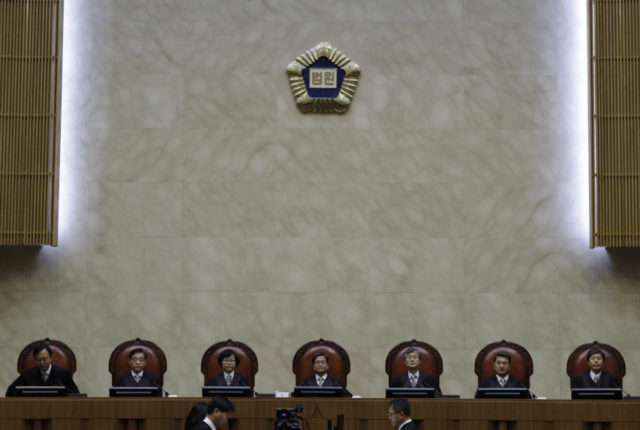SEOUL, South Korea (AP) — In a potentially far-reaching decision, South Korea’s Supreme Court has ruled that a Japanese steelmaker should compensate four South Koreans for forced labor during Japan’s colonial rule of the Korean Peninsula before the end of World War II.
The long-awaited ruling, delivered after more than five years of deliberation at Seoul’s top court, could have larger implications for similar lawsuits that are pending in South Korea and will likely trigger a diplomatic row between the Asian U.S. allies.
Seoul and Tokyo’s bitter disputes over history, also including issues surrounding South Korean women forced into wartime sexual slavery, have complicated Washington’s efforts to strengthen trilateral cooperation to deal with North Korea’s nuclear threat and China’s growing influence in the region.
South Korea’s Foreign Ministry spokesman Noh Kyu-duk said Tokyo and Seoul “should gather wisdom” to prevent the ruling from negatively affecting their relations. Japanese media earlier quoted Japanese officials as saying that Tokyo would consider taking the forced labor case to the International Court of Justice if the countries fail to resolve the issue diplomatically.
The court said Japan’s Nippon Steel & Sumitomo Metal Corporation should compensate 100 million won ($87,680) each to four plaintiffs. Among them, only 94-year-old Lee Chun-sik has survived the legal battle that extended for nearly 14 years.
“I won the case but I am here alone, so I am sad, a lot of tears are coming out,” an emotional Lee told reporters after the ruling. “It would have been good if we were still here altogether.”
The court rejected Nippon Steel’s argument that the matter of compensating forced laborers had already been settled by a 1965 treaty between the governments to restore diplomatic ties. The court also rejected the company’s argument that it was a different entity from the steelmaker that employed the South Koreans during the war.
Tokyo maintains that the $500 million Japan provided to South Korea under the 1965 treaty was meant to permanently settle all wartime compensation issues. But the Supreme Court in Tuesday’s ruling said the treaty does not terminate individuals’ rights to seek compensation for the “inhumane illegal” experiences they were forced into.
The four plaintiffs filed a damage lawsuit against Nippon Steel with the Seoul Central District Court in 2005 after two of them lost a similar suit filed in Japan. The Supreme Court in 2012 overturned rulings by lower courts that denied compensation for the plaintiffs and sent the case back to the Seoul High Court, which in 2013 ruled that Nippon Steel compensate the plaintiffs 100 million won each.
Tuesday’s ruling came more than five years after the company appealed the high court decision in August 2013.

COMMENTS
Please let us know if you're having issues with commenting.